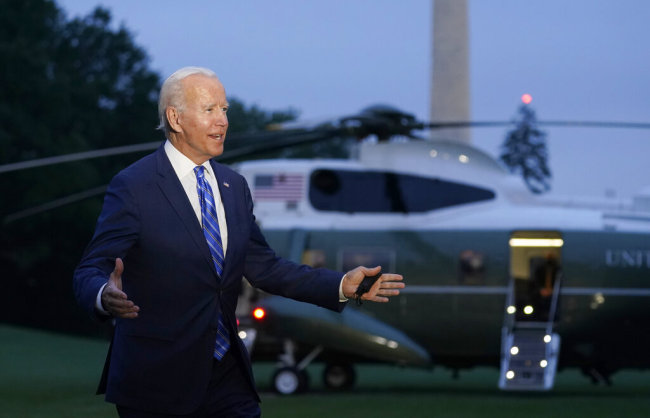Biden pushes big plans as key to avoid 'America's decline'
President Joe Biden and congressional Democrats edged closer to agreement Tuesday on how sharply to cut back his ambitious social spending plan, even as the president made a public case that the package will help keep the nation from losing its “edge” in global competitiveness.

President Joe Biden talks with reporters after returning to the White House in Washington, Oct. 5, 2021, after a trip to Michigan to promote his infrastructure plan. [Photo: AP/Susan Walsh]
Biden went to Michigan to promote the proposal for expanded safety net, health and environmental programs, but after his speech he acknowledged the inevitable as Democrats focus on a now-$2 trillion top-line for the package to win support.
“I want to make sure that we have a package that everyone can agree on," Biden told reporters. "It’s not going to be $3.5 trillion. It’s going to be less than that.”
“We’re going to get it done.”
On Capitol Hill, strong signs emerged that Democrats were coalescing around Biden’s push for a package in the $2 trillion range, a figure that seemed potentially acceptable to Sen. Joe Manchin, D-W.Va., and other centrists with reservations. With all Republicans opposed, Biden can’t spare the support of a single Democratic senator.
At the same time, new battle lines are being formed as Democrats decide which of the many programs they want to expand — health, education, childcare, climate change — will remain in the final proposal or be reduced or left behind.
And in a signal of how much still may change before the bill makes it to his desk, Biden later suggested he’d sign a bill that includes the so-called Hyde Amendment, which blocks federal funds from being used for abortions in most cases. Manchin wants it in the final bill, while progressive Democrats oppose it.
“I’d sign it either way,” Biden told reporters.
In his speech at a union training facility, Biden called opponents of his plan "complicit in America's decline,” as he argued his spending plan is critical to America’s global competitiveness. He said he wanted to “set some things straight” about his agenda and cut through what he dismissed as “noise” in Washington.
“America’s still the largest economy in the world, we still have the most productive workers and the most innovative minds in the world, but we’re at risk of losing our edge as a nation,” he said.
The president went on to spell out his plans in greater detail than he has in some time, after spending the past week deep in the details of negotiations on Capitol Hill.
He highlighted popular individual parts of the plan, including funding for early childhood education and investments to combat climate change, rather than the expensive topline. And he emphasized that the trillions in spending would be drawn out over a decade and paid for by tax increases on corporations and the wealthiest Americans.
Polling suggests that elements in the social spending bill and a related $1 trillion infrastructure bill — such as expanded child care opportunities and roads-and-bridges infrastructure projects — are popular with large parts of the public. But even some of the White House’s closest allies have worried that the West Wing has not done enough to sell the spending. That brought Biden back on the road Tuesday, hitting the red-leaning district of Democratic Rep. Elissa Slotkin to sell his policies.
“These bills are not about left versus right or moderate vs progressive,” Biden said. “These bills are about competitiveness versus complacency.”
Back in Washington, a more immediate problem was mounting as Senate Republicans are putting up hurdles to raising the nation's debt limit, a routine vote that's needed to allow more borrowing and prevent a devastating credit default. Biden said Democrats are considering changing the chamber's filibuster rules, which would lower the typical 60-vote threshold to 50, to do it.